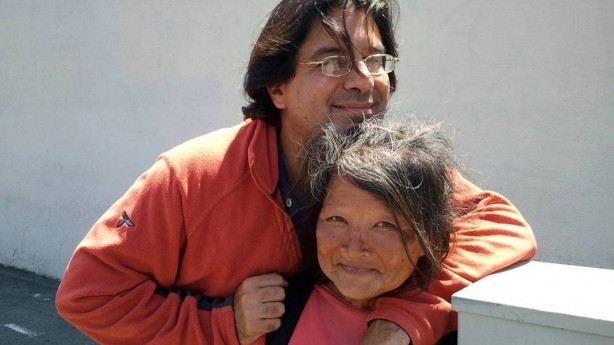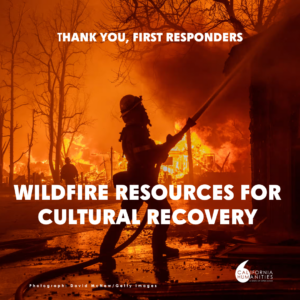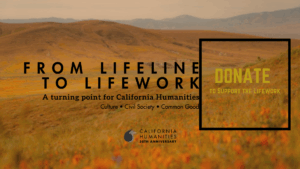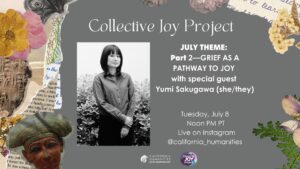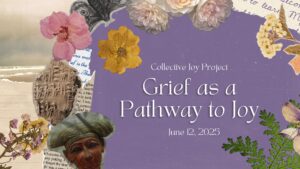DOGTOWN REDEMPTION, a raw, intimate and compassionate look at the lives of homeless recyclers in West Oakland, California, co-directed by Amir Soltani and Chihiro Wimbush, premieres nationally on May 16 in the PBS series Independent Lens. For specific broadcast times in your area, please visit PBS.org.
DOGTOWN REDEMPTION follows the lives of three recyclers—former punk rock drummer Miss Hayok Kay, former minister Landon Goodwin, and a titan of recycling known for collecting and hauling heavier loads than almost anyone else, Jason Witt. Set in West Oakland’s Dogtown neighborhood, the film is a complicated portrait of a community undergoing dramatic change—to Miss Kay, Landon, and Jason, recycling is the primary and often only source of money, but to newer higher income residents the metal carts and recyclers only add to the dirt, noise, and crime of the neighborhood. In DOGTOWN REDEMPTION we see a cross-section of life in West Oakland through the uniquely compassionate eyes of Soltani and Wimbush.
In advance of May 16 national broadcast, California Humanities talked with filmmaker Amir Soltani about his experience making the film.
Tell us a little about yourself – your background, other projects?
I grew up in Iran until the age of 12 and then came the revolution of 1979. The world I knew collapsed. Almost overnight. It was like being on the Titanic. Everything that seemed eternal and certain cracked. And a whole world, all that was familiar, disappeared. Khomeini’s arrival in Iran ushered in a new age. For me, that meant trauma: separation. Separation from family and friends, from home and school, and from the past and future. We had become strangers in our own country.
I was sent to school in England. Eventually, three years later, my mother and two younger brothers moved to Boston. And I joined them. But it was hard to realize that we had landed in America, that Iran was part of our past, and we had to build a new future. The trauma persists, as grief, as memory, and as exile—a sense of loss. The Titanic may be at the bottom of the ocean, with everyone you loved, but it is still alive in your imagination. As memory. And bonds. You never quite abandon or forget the dead.
Over time, with experience and education, you learn to interpret the past. You give it form, shape, voice and meaning. You make attempts, however pathetic, at forming new bonds. You turn separation into connection, isolation into community. You learn to unpack the trauma, play and even make friends with your demons. And you even learn to recognize them across cultures, as they shift faces and forms.
I have worn different hats. Historian, journalist, graphic novelist, filmmaker. Worked in business, in a lemonade factory. In Afghanistan, after the fall of the Taliban, building schools and other civil society initiatives. The strand that runs across all the projects is turning separation into connection, isolation into community, trauma into creativity. Often failing. Sometimes not. You never quite know what form your next project will take. You just situate yourself as best you can, trust in your intentions, and when the moment is right, you embark on your next journey.
What inspired you to make Dogtown Redemption?
As an immigrant, maybe even a refugee, you don’t take America lightly. It’s your sanctuary. It’s the country—the country—where you are offered a second chance at life. For those who are fleeing persecution, especially political and religious persecution, of the kind we were experiencing in Iran, America is where you are offered protection. It sounds corny, and it is corny. But it is also true. The constitution is not a piece of paper. It is a living document. We live in it. Every letter of the law counts.
Even though I am Iranian, and a Muslim, I felt deeply welcomed in America, not as a foreigner or a stranger, but as a friend, a fellow human being. The doors of this country were not closed to me and my family. Its heart was open. And its spirit abundant. My education at Tufts and Harvard was for free—full scholarships and all. That was not a measure of my intelligence. It was a measure of the American people’s generosity. I remember going to an event at Tufts to meet the folks who had given me an alumni scholarship. They weren’t hedge fund managers. They were regular folks. They did not know me. They didn’t need to. They knew what America stood for and why. That was the true gift they offered me and my family. Another shot at life. A chance not to drown, as so many are, not only in the Mediterranean, but in all our names and hearts.
So, rightly or wrongly, despite all the horrors, crimes and wars attributed to America, the Great Satan, I was one of millions of Iranians touched by America’s blessings. It was not that I believed in its promise. I had received its promise. And I don’t just mean money and scholarships. I mean friendships, feasts and fun. And not only that, at Tufts and Harvard, I could tap into the country’s very best minds. Sure, my father was stuck in Iran, compliments of the Ayatollahs. But in America, I had teachers and role models, beautiful, brilliant men and women whose radiant words and dazzling lectures shaped my soul and framed my world. And, none of them were the types to shy away from the big questions. Martin Sherwin, historian, took on Hiroshima. Tony Smith, political scientist, revolutions. Al Rubin, lawyer, international terrorism. Abe Chayes, lawyer, the Cuban missile crisis. Donald Fleming, historian, off the charts. Each of them had dared to ask difficult questions and to dedicate decades to pursuing answers. And those questions and answers, ultimately did not just define who they were. They defined America—who we were and what we were becoming as a civilization.
When I moved to West Oakland nine years ago, what I saw outside the window of my brother’s condo, negated my idea of America. I did not see the promise or the blessings that had been extended to me and my family. What I saw was desolation and despair. It is not that I was a stranger to poverty. But the poverty in West Oakland was particularly vicious. For whatever reason, I experienced it as an assault on my beliefs. I couldn’t tell if the America I had come to believe was an illusion, but there was definitely a gap between my beliefs and the reality on the other side of my window.
There was a refugee crisis in West Oakland. It was playing out right there, before my eyes, outside my brother Abdi’s condo. I could not see where another Titanic had collided against an iceberg, but out on the streets, it seemed as if people were barely floating, clinging to shopping carts-shopping carts—drifting, almost aimlessly, as if on so many lifeboats. In comparison, my brother’s condo, felt like a yacht.
Our fridge was full. Our home warm. Our beds cozy. And outside, just a few yards away, people would stop by our house, and go through the trash. I remember seeing one lady come by, and as she reached into the bin, deeper and deeper, I felt overcome by sorrow. How could that be happening outside our house. What did it say about me as a Muslim and an American. Why wasn’t she ringing the bell and asking for help. Why wasn’t I opening the door and offering help. How would there be such a divide, such separation, such silence, between us. I watched as she gradually emerged from inside the bin, neatly put away the trash, and moved on. If this were Iran, my grandmother would have invited her in for a meal. I just watched.
This ritual would happen every week. Every time we put our trash out. And it wasn’t just one person. Or two. It was one after the other. Dozens. Scavenging through the same trash can. In America. My America.
And so I started feeling a tension. I had a job, so most days, I would ignore it. But then, at nights, you would still hear the rattle of the shopping carts, and the sound would somehow hint at a story, each communicating a pace, a gait and an energy of its own. Some were quite fun. Like a locomotive, with three, four even five shopping carts zipping by. Some weren’t even shopping carts. They were strollers. And others were tugged by bikes. Or attached to dogs, as was the case with Jason, one of the recyclers whose story we tell in Dogtown Redemption.
Things just didn’t add up. There was such a gap between the America that welcomed us and the reality around me. We were all Americans, but we were living in two separate countries.
My America was about freedom and equality. These were not empty words. They defined the arc of American history. There was a lot of muscle in the architecture of language. And that muscle had torn down the chains of history. America was about ending slavery. It was about the civil rights movement. It was about the Marshall plan. It was about the war on poverty.
But not in West Oakland, at least, not outside my window. You see your fellow Americans pushing shopping carts, sleeping under highways, hungry outside your house, and dying on your streets, and you know that the arc of history has cracked, Martin Luther King and his dream are dead, and the debris is falling all around you.
And so, here we were, in Oakland. After the turn of the millennium. And one is left staring at the carnage of post-industrial exodus—a port city from which only decades earlier America had dominated the Pacific. All that old pride and glory, all those sinews of steel, were being stripped as scrap to be recycled in China. And so, just behind the port of Oakland, almost under the shadow of its cranes, there was scarcity and destitution, and even worse, humiliation. There was an abandonment, a betrayal of everything that had made me and my family, seek and find a home in America. In Oakland. Americans were seeking redemption in each other’s trash. I remember one day, looking in the trash. There was a piece of paper on the top of the heap, from a sermon, staring back at me. It read: “Where there is no vision, a people perish.”
What I found really depressing was not the poverty that surrounded the recycling center. It was the prejudice. Fear had become the prism that shaped our perceptions and aggression the language through which we related to each other. Somehow love was lost in the equation. It was almost beyond reclamation.
Consider, if you will, the logic. The poor—the weakest and most marginal members of our community—are framed as criminals and addicts lurking in the streets of West Oakland, exploiting homeowners, taxpayers, the city and waste management by stealing recyclables from the trash. And so there is a clamor to ban shopping cart recycling, and failing that, the recycling center, to prevent the poor from congregating around Alliance Metals to support their habits. The park outside Alliance Metals is fenced off in the name of creating a community garden. The bench busted. And the fountain left broken, covered in cobwebs.
Alliance Metals is scheduled to be shut down in August 2016. I know that on that day, a part of me and my America, a part of Oakland, will perish. Surely, we can do better than this. Perhaps it is time to summon a vision that speaks through our love rather than our fears.
What was the process of making Dogtown Redemption like?
I always joke that we did not make this documentary. It made us. Process? What’s that? What is much more important than process is intention. Everything that can go wrong, will. Many times. You will botch interviews. You will lose releases. You will run out of money. You will fall and fail over and over again. It is guaranteed. Your only insurance is your intention—the vision and commitment behind a project. And, of course, your colleagues.
I had the good fortune of working with an extraordinarily gifted and compassionate filmmaker, Chihiro Wimbush. He gave the story and the characters everything he possibly could, and then some. Manuel Tsingaris joined us as editor, and lent us his immense talent. Ray Telles was our resident guru. And Denise Zmekhol, director of Children of the Amazon, swept in like a phoenix and helped us reach the finish line. Our executive producers were magnificent, wise, generous and formidable allies. As Miss Kay would always say, we were “lucky lucky.”
How did the humanities help inform the project?
We drew very heavily on Michael Harrington’s “The Other America: Poverty in the United States,” and Robert O. Self’s classic “American Babylon: Race and the Struggle for Postwar Oakland.” They are monumental. Each opened our eyes to deeper histories and helped us think about fundamental questions about the distribution of wealth and the definition of space in the city. We actually interviewed Robert Self—and he helped us understand the ways in which the rules governing the flows of capital sculpt cities. But the humanities help in other ways too. They allow us to break out of the confines of disciplines and to encounter each other in new, fresh ways, from places and perspectives that are not fully defined. They leave room for ambiguity and paradox, even eccentricity. In a world in which everything gravitates towards uniformity and conformity, there’s something to be said for holding onto tensions, differences and contradictions without needing to plug all variances into a prefabricated formula, all for the pleasure of producing an instant or quick solution. The humanities allow us to grapple with situations and contexts that are not immediately apparent. But they also leave room for magic and mystery—for an embrace, a wink, a tickle or even a kiss.
DOGTOWN REDEMPTION was supported by California Humanities through the California Documentary Project.

